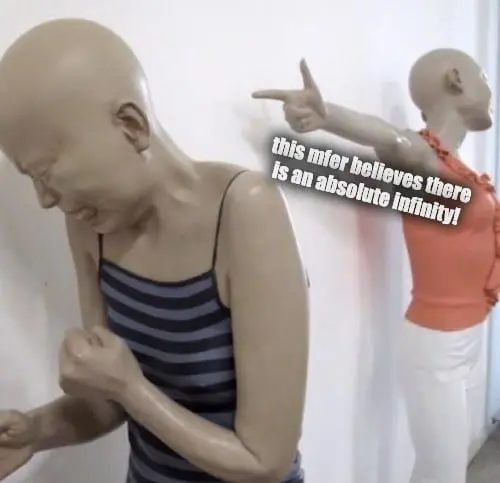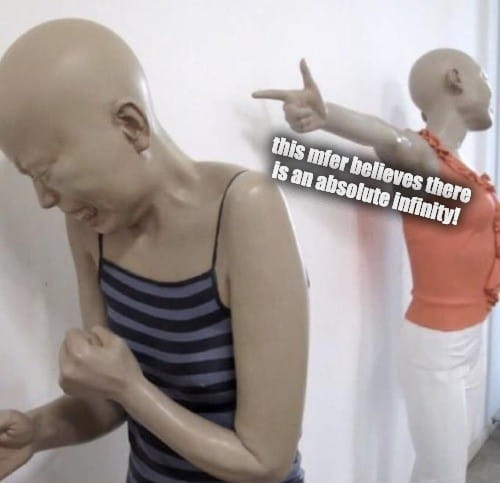"A number is how far along you are on your journey, infinity is the horizon you journey towards." - Some guy I met in a pub
Science Memes
Welcome to c/science_memes @ Mander.xyz!
A place for majestic STEMLORD peacocking, as well as memes about the realities of working in a lab.

Rules
- Don't throw mud. Behave like an intellectual and remember the human.
- Keep it rooted (on topic).
- No spam.
- Infographics welcome, get schooled.
This is a science community. We use the Dawkins definition of meme.
Research Committee
Other Mander Communities
Science and Research
Biology and Life Sciences
- [email protected]
- [email protected]
- [email protected]
- [email protected]
- [email protected]
- [email protected]
- [email protected]
- [email protected]
- [email protected]
- [email protected]
- [email protected]
- [email protected]
- [email protected]
- [email protected]
- [email protected]
- [email protected]
- [email protected]
- [email protected]
- [email protected]
- [email protected]
- [email protected]
- [email protected]
- [email protected]
- [email protected]
- !reptiles and [email protected]
Physical Sciences
- [email protected]
- [email protected]
- [email protected]
- [email protected]
- [email protected]
- [email protected]
- [email protected]
- [email protected]
- [email protected]
Humanities and Social Sciences
Practical and Applied Sciences
- !exercise-and [email protected]
- [email protected]
- !self [email protected]
- [email protected]
- [email protected]
- [email protected]
Memes
Miscellaneous
was that guy Socrates or perhaps Einstein
No, it was a philosophy PhD student on his 2nd bottle of tequila apparently.
I believe there's an absolute infinity.

Meh. Everything that can happen, does happen.
Ban pls
Anybody remember what the floating brain appearing out of nothing theory because infinity exists?
Boltzman Brain.
Thank you! An enjoyable albeit maybe terrifying (for the individual) thought if infinity exists
Heck, you don't even need an absolute infinity. Just a universe with enough fluctuation, and there are quite a few theories with that.
Infinity is a concept that we made up for the purpose of explaining some math. Prove me wrong.
Infinity. Checkmate.
Infinity plus 1.
Oh yeah??? Infinity plus 2. Get destroyed.
Infinity + infinity = 2 * infinity... 3 * infinity ... Infinity * infinity = infinity^2 ... Infinity^3 ... Infinity^infinity ...
If infinity is the "first" i.e. Natural infinity than those are all well defined things (Ordinals)
I dunno about proving you wrong, but the fact that you can comfortably say there is no largest natural number is kind of a belief in infinity
That seems more like an engine limitation than proof of infinity, to me anyway.
Quite the opposite imo, if there was a definite "largest number", it would be an engine limitation. It is literally an actual issue with numbers representations in computers.
Now, some aspects of quantum physics really feel like IRL engine limitations though
Which theory is the most plausible?
IMO? That infinity is just a concept to occupy professional thinkers that breaks every construct wherein it's applied.
Where and how does it end? Both infinity and non-infinity seem strange to me.
Our mathematical definitions say that it does not end. We've defined addition so that any number + 1 is larger than that number (i.e. x+1 > x).
You're probably confused, because you think infinity is a concrete thing/number. It's not.
In actual higher-level maths, no one ever does calculations with infinity.
Rather, we say that if we insert an x into a formula, and then insert an x+1 instead, and then insert an x+2 instead, and were to continue that lots of times, how does the result change?
So, very simple example, this is our formula: 2*x
If we insert 1, the result is 2.
If we insert 2, the result is 4.
If we insert 82170394, the result is 164340788.
The concrete numbers don't matter, but we can say that as we increase x towards infinity, the result will also increase towards infinity.
(The result is not 2*infinity, that doesn't make sense.)
Knowing such trends for larger numbers is relevant for certain use-cases, especially when the formula isn't quite as trivial.
Limits at infinity are one thing, but infinite ordinals are meaningfully used in set theory and logic
That is until you meet analysis people that define a symbol for infinity (and it's negation) and add it to the real numbers to close the set.
Also there are applications in computer science where ordering stuff after the first infinite ordinal is important and useful.
Yea unfortunately we do kinda calculate with infinity as a concrete thing sometimes in higher level maths...
I'm not sure anyone has really provided a complete explanation of what is the difference between working with an absolute infinity and the way we do math normally in science and such.
Basically, no one has found the idea of using an absolute infinity to explain the world to be better than the way we deal with infinity in college courses. In college, you run across the idea that some infinite sets are larger than others (countable numbers vs uncountable). Edit - I think you could have the idea of different sized infinities and a final largest absolute infinity. It’s just that this concept isn’t useful. It would be like claiming God is purple. Nobody can prove you wrong and it doesn’t matter.
Of course, an infinite set makes sense in math, and has practical uses in the sciences, but nothing can truly be demonstrated to be unending. Another poster put it nicely - infinity is a direction, not a destination.
I recommend this video How to count past infinity by Vsauce (about 20 minutes long). It is closer to entertainment than a lecture but its pretty good. I'm only an undergrad math major but I haven't found any real problems with this video (though, he does start talking about ordinal numbers which aren't terribly useful to anyone that I know of, yet, except for some really complicated number theory stuff cryptographers might use, don't ask me. cryptographers are basically wizards imho).
The question doesn't make sense, there are many things which have an infinite quality (like infinite cardinality) or are called infinite/infinity (like infinite cardinals and ordinals). They're not contradictory. They coexist the same as all finite things do.
There is currently no way to observe any of this empirically, so the question is pretty much moot. It's speculation either way.
Explain?
Might be this? https://en.wikipedia.org/wiki/Absolute_Infinite
Or this is about some people thinking infinity is just a really big number, with which you can do calculations like e.g. (these are non-sensical!):
- ∞ - ∞ = 0
- 2*∞ > ∞
these are non-sensical
Transfinite algebra is a widely-accepted aspect of mathematics.
↑Statements dreamed up by the totally Deranged
I mean, the Casimir effect was initially derived as the result of two infinite values having a finite difference.
Bonkers
There are different kinds of infinity
"Countably infinite" means an infinitely-large set of numbers that could be generated by infinitely following an algorithm with a finite number of steps. For example, natural (positive whole) numbers are countably infinite because they could be generated by following this simple algorithm:
- Start with the number 1
- Add 1 to your number
- Repeat step 2
The set of real numbers, on the other hand, is uncountably infinite because you can have an infinite number of digits after the decimal place. You can't define a finite generation algorithm like the one above simply because any precision you use wouldn't cover the full range. In other words, if you wanted to modify the above algorithm, and chose 0.1 as your starting number, your algorithm would miss 0.01. If you chose to start at 0.01, you would miss 0.001, and so on
That is the way it is often taught but actually both sets are infinite that is have no ends or in other words are not bounded.
The thing that is confusing to understand is that the question how many there are and how much there is diverges at infinity.
Our intuition (as finite beings) is broken here. Both sets are infinite but in one is more than in the other. That does not make one set more infinite than the other. You cannot be more unending than to literally have no end.
This is incorrect. There is not a one-to-one and onto mapping from the natural numbers to the real numbers ergo the sets have a different size. We have defined words to describe this. We can put uncountably many copies of the natural numbers inside of the real numbers so there are arguably infinitely more reals than naturals.
Granted you have to accept the axiom of choice for any of this.
I know. I've studied this extensively. I am specialized in formal logic and by extension set theory. I've worked with and help write actual research papers in this field where this is basic knowledge.
I've never claimed there to be a bijection between the reals and the natural numbers. Please point out what statement I made that is wrong. I would very much like to know.
Also no you do not have to accept choice for this to be true. ZF is perfectly acceptable to study various infinite sets with differing cardinality.
Edit: This is what I mean when I say that our intuition is broken. One set can be larger than the other but both be non-ending that is infinite.
Beeing larger does not mean it is more infinite!
That does not make one set more infinite than the other. You cannot be more unending than to literally have no end.
Your use of language is incorrect. But, since you’re clearly the only published expert with any experience in this topic on the internet, it’s really not worth pointing out that we fall on two sides of the standard axiom of choice debate since you already knew that. Have fun!
My use of language could very well be incorrect. I am not a native English speaker anyways. That's no reason to be so condescending.
I was just merely stating my credentials to have a basis of discussion but you do not seem to be interested in that.
|♾️|
I misread that as "absolute immunity" and thought you had posted to the wrong community.
The meme works just as well, "absolute immunity" is just more topical and political than mathematical
